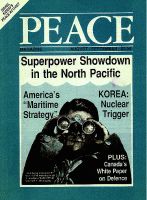
Peace Magazine Aug-Sep 1987, page 33. Some rights reserved.
Search for other articles by Richard Leach here
Noam Chomsky, Turning the Tide: The U.S. and Latin America. Montréal: Black Rose Books 1986, 298 pages
In 1984, writing in the Times Literary Supplement Joseph Brodsky petulantly explained "Why The Peace Movement Is Wrong": "In the strict sense of the word, a modern pacifist doesn't qualify to be so called, since he is against the obliteration of the species, while not against the destruction of individuals. In other words, the peace movement concerns itself with the prospect of global mass annihilation, not with war's localized, individualistic versions." This view has recently been echoed by Noam Chomsky in his book, Turning the Tide: The U.S. and Latin America. He analyzes the linkage between the Cold War and the arms race, and says that decoupling the issues is both unethical and dangerous. Chomsky doubts that the prospects for peace and survival are enhanced by "efforts to reduce nuclear arsenals if such moves are not an integral part of a more general program to constrain state violence."
He advises us to work to reduce the possibility of superpower confrontations where they are most likely to occur (e.g. the Third World). Chornsky's point is well-taken: In a poll of military experts, 55 percent ranked Middle East conflicts as the most likely cause for nuclear war; 16 percent chose accidental use.
In his critique of decoupling, Chomsky points to the US-backed Israeli attack on Lebanon in June 1982, which brought the superpowers close to nuclear war as Israel attacked Syrians (a Soviet ally). This was followed by the "shameful" refusal of anti-nuclear protesters to condemn it; the huge New York march which followed a week later displayed no recognition of the connection between the two issues.
The political savvy of Chomsky, on the other hand, demands that we clarify our long-term goals. Echoing the point made by Jonathan Schell in the underrated book The Abolition, he reminds us that: Even if the arsenals were vastly reduced, a nuclear interchange would be a catastrophe. In fact, even if they were reduced to zero, the capacity to produce nuclear weapons would not be lost and would be used in the event of a superpower conflict.
This salient point was made by Bertrand Russell more than two decades ago. These important thinkers agree in seeing the only hope for mankind in a fundamental change in our international structure. While it performs admirably in its demystification of official propaganda, it is the book's sophisticated grasp of the (much ignored) political implications that make it so valuable.
Chomsky's discussion of the freeze movement and what we can learn from it are instructive: It succeeded in convincing three-fourths of the population to support it, along with the USSR and world opinion. But, the failure was it had little impact on American politics. It compelled the Administration to enter into negotiations "for the obvious purpose of pacifying public opinion, here and in Europe, so that it could proceed with the planned arms escalation."
Chomsky even takes Randall Forsberg, director of the Institute for Defense and Disarmament Studies, to task for issuing a letter on the freeze which concluded that despite the successes just mentioned, it did not lead to "a real electoral choice" because of "expert opposition" to the freeze, which prevented Mondale from jumping on the bandwagon. Forsberg's conclusion was that we must devote our efforts to "building expert support" in order to accomplish the objective of a freeze. Chomsky's rebuttal:
The underlying assumption is that the military system drives forward because political leaders and their expert advisers do not understand some technical points that are clear to us in the peace movement, and all we must do is explain to them a better way to achieve their goal of security and peace.
He points out with devastating acumen that this agenda can result only in continued marginalization of the public, whose continued apathy, obedience, and faith in alleged "experts," will enable the government to proceed with business as usual. He asks us to witness the case of Star Wars, where: "...when experts disagree and the facts are uncertain, the reasonable thing to do is to try." Meanwhile, the arms race can proceed unencumbered. The alternative is to tell people the truth: that the security of the U.S. has rarely been a matter of central concern, and that the military system has been driven by different factors.
Those of us who see the arms race as an irrational reliance upon a "technological fix" to achieve security fail to recognize that business and government planing is short run, and very rational for the privileged elite who benefit. The real reason for the vast and expanding military system, is "to permit free exercise of Cold War policies of intervention, and to use the Pentagon system for the purpose of state intervention into the economy," that is, what J.K. Galbraith calls "military Keynesianism:" the creation of state-guaranteed markets for high technology waste (armaments). Reading Chomsky makes one feel like Wins ton Smith reading the anti-propaganda of Emmanuel Goldstein: He reveals that such ventures as Star Wars are actually known by the planners to decrease national security, a risk they are quite willing to accept. Chomsky's message is hard-headed realism: if the Soviet Union didn't exist, the Pentagon would have had to invent it.
Richard Leach studies at McMaster University

Peace Magazine Aug-Sep 1987, page 33. Some rights reserved.
Search for other articles by Richard Leach here